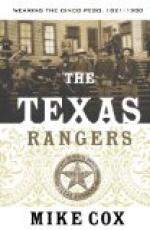“That’s right,” agreed the older man, rubbing his stubbly beard with his hand. “That’s sho’ly right.”
“But they might get you before they understood,” Arlie urged.
“Oh, I’ll keep under cover, and when it’s time, I’ll sing out and let them know. Better leave me that rifle, though.” He went right on, taking it for granted that she had consented to go: “Slip through those shadows up that draw. You’ll have no trouble with Teddy. Whistle when you’re ready, and your father will make a break up the hill on his hawss. So-long. See you later some time, mebbe.”
She went reluctantly, not convinced, but overborne by the quality of cheerful compulsion that lay in him. He was not a large man, though the pack and symmetry of his muscles promised unusual strength. But the close-gripped jaw, the cool serenity of the gray eyes that looked without excitement upon whatever they saw, the perfect poise of his carriage— all contributed to a personality plainly that of a leader of men.
It was scarce a minute later that the whistle came from the hilltop. The mountaineer instantly swung to the saddle and set his pony to a canter up the draw. Fraser could see him join his daughter in the dim light, for the moon had momentarily gone behind a cloud, but almost at once the darkness swallowed them.
Some one in the sagebrush called to a companion, and the Texan knew that the attackers had heard the sound of the galloping horses. Without waiting an instant, he fired twice in rapid succession.
“That’ll hold them for a minute or two,” he told himself. “They won’t understand it, and they’ll get together and have a powwow.”
He crouched behind the dead horse, his gaze sweeping the wash, the sagebrush, and the distant group of cottonwoods from which he had seen a shot fired. Though he lay absolutely still, without the least visible excitement, he was alert and tense to the finger tips. Not the slightest sound, not the smallest motion of the moonlit underbrush, escaped his unwavering scrutiny.
The problem before him was to hold the attackers long enough for Arlie and her father to make their escape, without killing any of them or getting killed himself. He knew that, once out of the immediate vicinity, the fugitives would leave the road and take to some of the canyons that ran from the foothills into the mountains. If he could secure them a start of fifteen minutes that ought to be enough.
A voice from the wash presently hailed him:
“See here! We’re going to take you back with us, old man. That’s a cinch. We want you for that Squaw Creek raid, and we’re going to have you. You done enough damage. Better surrender peaceable, and we’ll promise to take you back to jail. What say?”
“Gimme five minutes to think it over,” demanded the Texan.
“All right, five minutes. But you want to remember that it’s all off with you if you don’t give up. Billy Faulkner’s dead, and we’ll sure come a-shooting.”




